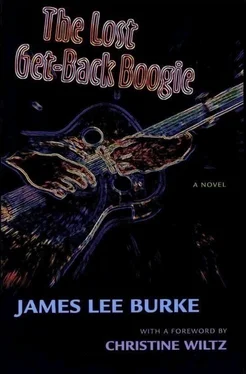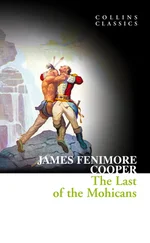“Why?”
“Because you never take a shot from a distance like that without a telescope.”
“Should I apologize?”
“Don’t be defensive about it. Hell, you know you were wrong.”
She picked up my coffee cup from the snow and drank out of it, then took a deep drag on the cigarette.
“Buddy told me you could be righteous sometimes,” she said.
“Well, shit, you let off on something that you can only hit with luck, and she wanders around for two days before she dies.”
We didn’t speak for a moment, and I ejected the spent shell from the Enfield and slipped out the unused cartridges from the magazine. She looked out over the valley, where the last light was starting to glow in a rim of fire on the mountain’s edge.
“You didn’t want to shoot anything and you did,” she said. “You want me to walk home with my mad money?”
I pulled the hood of her coat up on her head and tied the strings under her chin. Her cheeks were red, and there was still a brush of snow in the black hair over her eyes. I pushed her hair back with my hand and stuck one stiff finger in her ribs.
“We’d better get her on the sled before they send the search-and-rescue in after us,” I said.
She looked away, still angry and unwilling to give up, then kicked me gently in the calf with her boot and turned her fine woman’s face into mine.
The snow was already starting to freeze as we pulled the sled across the valley floor. Our boots crunched through the surface, then sank in the soft snow underneath, so that by the time we reached the doe, we were sweating inside our clothes, and the moon had come up in a clear sky and turned the whole valley into a blue-white, tree-lined place on the top of the world that made you fear time and mortality. I gutted the deer and threw the steaming entrails on the ground, and we tied down the frozen carcass on the sled and worked our way back up toward the dark border of pines. The sleeves of my coat were splattered with blood, my head was dizzy from the thin air and the effort of pulling the sled up the hill behind me, but I felt a quiet exhilaration in the long day and its completion. We roped the doe on the fender of the car and drove back out of the moon-drenched mountains of the Swan Valley toward Missoula, and as I steered down that blacktop highway with those huge, dark shapes on each side of me, I understood why men like Jim Bridger, Jedediah Smith, and Jim Beckworth came here. There was simply no other place better, anywhere.
The next week Frank Riordan got his way with the state of Montana, the Anaconda Company, and in fact the whole lumber industry and anybody else who had anything to do with polluting the air. He and an environmental group got a temporary injunction from the court in Helena to shut down every pulp mill and tepee burner in western Montana. It was one of those things that nobody believed. A court decided on an abstraction that had nothing to do with economics, jobs, or clean air and water. It was just a matter of law. A judge’s signature went on the injunction, and suddenly the plume of smoke blowing down the Clark thinned and disappeared, and the tepee burners smoldering with sawdust crumpled slowly into ash and were covered by snow.
But other things happened, too. The workers at the plywood mill got a pink slip with their next check, the men who planed boards and pulled the green chain at the lumber companies were told to come around again in a month or so, the Anaconda Company was shut down at Bonner, and the gyppo loggers (the independents who owned their own tractors) had to either haul pine to a market in Idaho or Washington or go out of business.
Beth had told me once what a lumber town could be like when the mills shut down and the paychecks stopped and families had to line up at the federal food-surplus center. Except in this case there was no workingman’s strike involved, no collective anger directed at management or unions, no depression to be blamed on federal bureaucrats and New York sharpers. Every unemployed man in Missoula County and the Bitterroot Valley knew there was only one reason for the deprivation of his family, his humiliation at accepting welfare and food commodities, and his daily visits to the state employment office for the chance of a casual labor job with the Forest Service: Frank Riordan.
Their mood was mean and dirty. It took on different forms that ran the gamut from an insult in the face to the failure of a neighbor to wave out of his truck cab, but it was all the same thing. I can’t say that they hated him, because they didn’t; it was more a matter of outrage and disbelief that one of their own kind would betray them and join forces with college people and slick lawyers to cause so much trouble in their lives.
I stopped going to the Oxford in Missoula for steak dinners after I sat at the counter and heard the loud and pointed remarks from the poker table behind me, and Eddie’s Club across the street was no place to have a beer in the afternoon when there were three or four drunk men against the bar who would happily bust your head open with a pool cue. One day I walked up to the small grocery store on the blacktop for a loaf of bread and a quart of milk, and the woman behind the counter looked through me like smoky glass while she counted out each hot coin in my palm.
The irony is that my job was also affected when the mills shut down. Our band was fired at the Milltown Union Bar, Cafe and Laundromat. On Saturday night, the first week after the injunction came down, there was a crowd of five people in the bar, and all of them were drinking on the tab. We played loyally to them until one in the morning, which was like singing into a neon-lighted cave, and the owner paid us off, gave us free bowls of chili and a fifth of Cutty Sark, and said to come back when the mills opened.
I could do without the job financially, because I had money in the bank, but our steel man and bass player got loaded on the bottle of Scotch in their truck before they drove home. Both of them had been laid off at the sawmill in Seeley Lake, and they had been cleaning furnaces three and four days a week to make enough, along with their three nights’ work at the bar, to keep from going on welfare until the mills reopened.
Now I had no job, except for my work on the ranch, and no place really to go. I lived with a man whom I had made a cuckold out of. I slept with his wife every evening I could get into Missoula, and without embarrassment he and I fished each afternoon through the ice on the Bitterroot, which was shameful in itself. On the nights I couldn’t be with Beth (because of her boys or her temporary job waiting tables at the bus depot) and when Buddy went off to play at the college pizza place, I stayed alone in the cabin and drank neat whiskey and looked out the window at the fields of snow under the moon and the glistening sides of the canyon behind the Riordan house.
I worked on my song, the one I had never finished while I was in the penitentiary. The strange thing was that I could play lead on almost any country song that I had ever heard, and I could imitate Hank Williams, Jimmie Rodgers, and Woody Guthrie in a way that left a southern or Okie audience banging their tables with beer bottles when I finished. But I couldn’t write a song myself. As I sat there with the three tortoiseshell picks on my fingers and the Gibson across my knee, I was reminded of an old Negro preacher who did odd jobs for my father. His son had been given five years on Sugarland Farm in Texas, and when the old man was told of the sentence, he said: “I tried to keep him out the juke joint. But he just like a mockingbird. He know every song but his own.”
I had most of my song, but the rest wouldn’t come. Maybe that was just because when you try to catch all of something, particularly something very good, it must always elude you in part so that it retains its original magic and mystery. I remembered when my cousin Andre and I found an Indian canoe submerged in four feet of water back in the swamp. The canoe was made of cypress and had stayed intact for over a century. The bow and sides were etched against the silt bottom with green moss, and we slid through the water quietly so as not to cloud it, our hearts tripping inside our wet shirts. We caught the canoe by each end and tried to lift it slowly, and when it wouldn’t rise, we pulled harder and our hands slipped on the moss, and the silt swelled out in a black balloon from the bottom. Then I ducked under the surface again and jerked on the bow with all my strength. It ripped away like wet newspaper in my hands. I felt heartsick, and with each of our hurried, young efforts to salvage what was left, we tore the canoe into dozens of pieces until finally we had only a pile of rotted cypress wood, like any other in the swamp, to take home in the bottom of my pirogue.
Читать дальше












